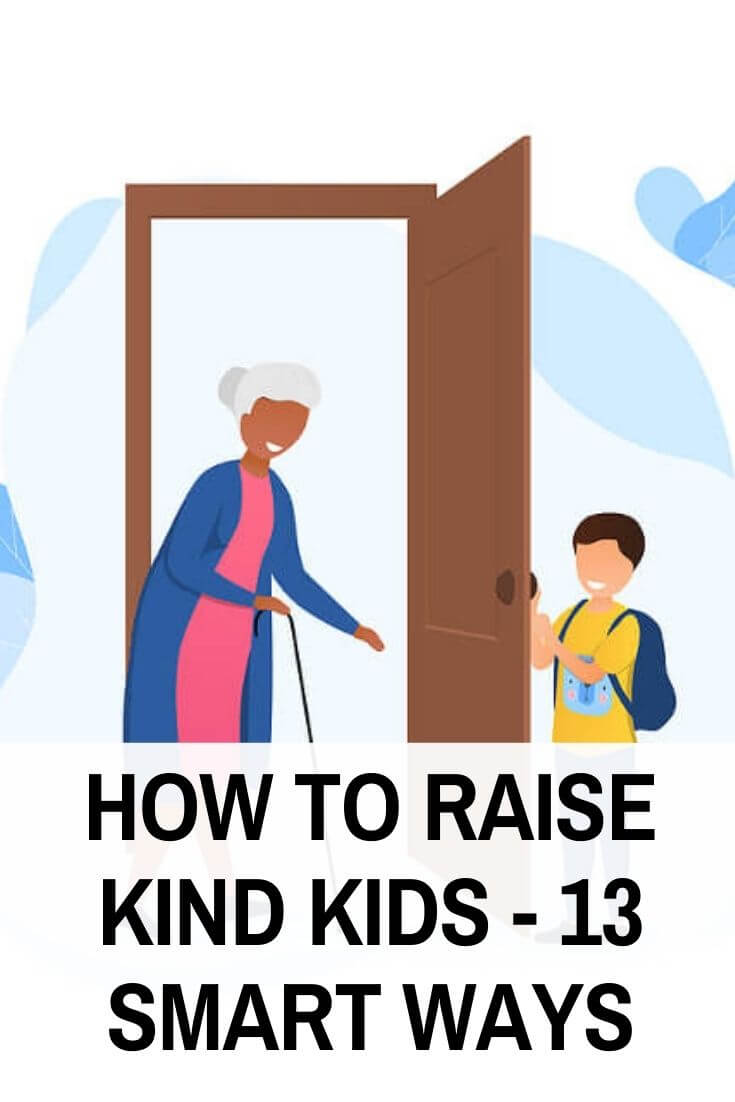
A kind child is the best kind! But this can be easier said than done. Let’s face it, between fighting with siblings to putting gum in a classmate’s hair, children aren’t always known for being on their nicest behavior. So, we have two options: Stop reproducing and end the human race or teach our children that kindness counts. The latter is much less dramatic.
So, how to raise kind kids? Showing them kindness is a good start and so is the following:
1. Make Kindness your Motto:
If kindness is your family motto (The Nelsons are Nice!), it’s a lot easier to keep it at the forefront. It also helps you develop guiding principles and a sense of purpose as a family unit. It becomes your identity and simply a way of existing.
Whenever you’re engaged in acts of kindness, you offer to clean the house of a friend with a broken leg or you do yardwork for your elderly neighbor, solicit the assistance of your children. This gives them the chance to see that they have the ability to help others, which empowers them, makes them feel good, and gives them a feeling of accomplishment. It even helps them recognize how nice it feels when someone does something for them.
2. Make Character Key:
Whenever your child practices kindness, they share with their annoying little brother, they go out of their way to show generosity toward a stranger, or they lose a championship game with class, laud them, thank them, or make an otherwise big deal out of it. And, if they fail to do this, remind them that character counts….and counts a lot.
3. Value Values:
Take the opportunity to use everyday situations, even things that your children watch on television and in cartoons, to remind your kids of the importance of values. If Bugs Bunny pokes fun at Daffy Duck for the way he talks, ask your child to consider whether that exhibits kindness. Then be sure to put your money where your mouth is. If your child sees you in moments of unkindness, they’ll follow suit. In other words, don’t you go making fun of Daffy Duck, either.
4. Correct Mistakes:
Even the kindest of people aren’t kind at all times; that’s what you get for being human. When you catch your child engaging in acts that lack niceties (and you will catch them), address the behavior as soon as you can. Then remedy it by asking them how they think their behavior affected the other person and asking them to consider how it would feel if the same thing was done to them.
5. Apologize when Warranted:
While you definitely want to acknowledge unkind behavior (as addressed above), you want your child to make amends too. Brainstorm with your child ideas on what they can do to make things better and remedy any hurt feelings that they might have caused. Show them that do overs can mean “do betters.” For instance, if your child tore up their friend’s picture, recommend that they draw them a new one.
6. Hold them Accountable:
If your child did something especially unkind, make sure the punishment fits the crime; this may mean extra punishment on top of the talking to. Rather than enforcing a blanket punishment (such as taking away their precious Minecraft) consider something more applicable to their infraction. For example, if they broke their sibling’s scooter, consider taking their scooter away for a week.
7. Take the Focus off of Winning:
When your child is engaged in something where winning is the end goal (such as a baseball tournament or a chess match), focus less on the thrill of victory and more on the thrill of being a good teammate or fair sport. Along these lines, if your child shows bad sportsmanship, hold them accountable.
8. Be Nice to Mother Earth:
Littering isn’t always intentional; in fact, sometimes people drop things by mistake, notice, and chalk it up to no big deal. If you drop something, or your napkins or paper plates blow away in the wind, make sure you retrieve your mess. And, even if the mess isn’t yours, consider putting in an extra effort. Your child is watching and this teaches them to be kind to the planet. They have to live here, after all.
9. Have your Child Help Around the House:
Assigning your child chores is a great way to teach them responsibility but it also reinforces the idea of being kind (especially if they’re expected to complete these chores for no reason in particular). You don’t need them to resod your lawn but task them with taking out the trash or cleaning the hamster cage. When children learn to be helpful, they learn – in turn – to be kind.
10. Don’t Shame them for Trying:
Parents have a habit of doing things themselves because it’s faster and more efficient. It might take you 15 minutes to clean the kitchen and your child 2.5 days. However, criticizing your kids for taking too long or leaving behind some dust bunnies will deter them from helping again, which can put a dent in their kindness capacity. If you want kids to do good in the world, they need to be encouraged to do good at home, first.
11. Point out the Positive:
Life is hard, even for kids. And there’s often bad news happening all around us. Instead of focusing on the doom and gloom, promote the positive by focusing on positive books, positive TV shows, positive movies, and positive news. For example, if you see a news story about kids starting a recycling program or volunteering at an animal shelter, point it out. Positivity begets positivity and focusing on it teaches children to contribute to society in a beneficial way.
12. Help your Child Include Others:
Being an includer is one of the kindest things a kid can be. Encourage your child to make a habit of including others on their kickball team, in their games of Hide-and-Seek, and in their fort building adventures. Everyone needs to feel like they matter!
13. Get them Involved so They're Not Self-Involved:
In today’s society of social media and selfie sticks, being self-involved has become the norm and this reduces our capacity for compassion. But kids who connect outside of themselves aren’t only happier, they’re kinder too. Encourage your child to give back to the people around them by getting offline and connecting with others in the real world. For instance, make a suggestion that they join the Boy Scouts or the Girl Scouts as a way to make friends and make a difference.
Like the saying goes, “In the end, only kindness matters.” As parents, most of us can agree that having a kind child is more important than having a star athlete or a prodigy who speaks Latin at six months of age. Thus, use the tips above to help cultivate kindness in your child and yourself along the way!
Related Posts:
How to Raise a Respectful Child – 15 Simple Tips
How to Unspoil a Child (Starting Today): Top 10 Tips
15 Quick Tips on How to Raise a Grateful Child
